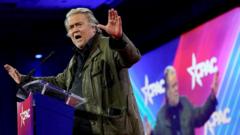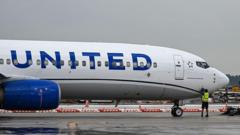The election of Chicago-born Pope Leo XIV has sparked discontent among supporters of Trump’s MAGA movement, with key figures expressing concerns that the new Pope, known for progressive stances on issues like immigration, may not align with their conservative values.**
Pope Leo XIV Faces Tensions with Trump's MAGA Movement Over American Values**

Pope Leo XIV Faces Tensions with Trump's MAGA Movement Over American Values**
The selection of Pope Leo XIV raises questions as he appears at odds with the 'America First' agenda favored by many in Trump’s corner.**
The election of Pope Leo XIV, born Robert Francis Prevost in Chicago, has ignited controversy and disappointment among supporters of the 'Make America Great Again' (MAGA) movement. While President Trump has publicly acknowledged the Pope's election as a “great honor” for the U.S., many in Trump’s camp have expressed frustration, suggesting that the first American Pope may not align with their 'America First' doctrine.
Pope Leo XIV, from the outset of his papacy, has demonstrated a focus on social issues, voicing concerns for the poor and immigrants. His selection of a name that echoes more progressive Church leadership further heightens skepticism amongst conservative supporters. Steve Bannon, former chief strategist for the Trump administration, articulated a foreboding outlook regarding potential friction between the Pope and the President, emphasizing a history of critical commentary from Leo towards U.S. politicians.
The Pope’s brother openly acknowledged that he is unlikely to remain silent on prevailing political issues. He highlighted Leo’s dissatisfaction with current immigration policies, reflecting a broader concern among some U.S. Catholics who may hope for continuity with the more compassionate, progressive approach of his predecessor, Pope Francis.
Polling data underscores the complexities of Catholic affiliation in the U.S., revealing that approximately 20% of Americans identify as Catholic, with a significant portion leaning towards the Republican Party. However, critical perspectives do exist. For instance, many American Catholics diverge from the Church's official stances on topics like abortion, highlighting the nuanced relationship between personal beliefs and ecclesiastical doctrine.
In the wake of Leo's election, Chicagoans have voiced their hope that he will carry forward Pope Francis's inclusive agenda. Meanwhile, the U.S. Conference of Catholic Bishops celebrated the Pope’s election, reinforcing his role as a unifying figure for the Church, suggesting that he will attempt to transcend the disparate political ideologies within the Catholic community.
Despite being a minority among U.S. Catholics, MAGA supporters wield significant influence in conservative media circles. On platforms associated with Bannon, criticisms of Pope Leo have circulated, with some declaring that his progressive leanings reflect a disconnection from traditional conservative Catholic values.
Compounding the uncertainty surrounding Pope Leo are his previous social media activities, which include critiques of Trump and his administration's stance on immigration. This has raised red flags for MAGA commentators, who perceive his election as a direct challenge to Trump’s political legacy.
Commentary from various MAGA influencers indicates widespread suspicion about the Pope’s intentions. Some have gone so far as to label him an “anti-Trump” figure aligned with the liberal agenda, further deepening the rift between the Vatican and elements of the MAGA movement.
As the new pontiff settles into his role, the relationship between the Vatican and the White House remains deceptively complex, with potential implications for American Catholics caught between their faith and political loyalties. Observers anticipate that tensions may arise as Pope Leo XIV navigates the intersection of religious guidance and contemporary socio-political issues in the United States.























